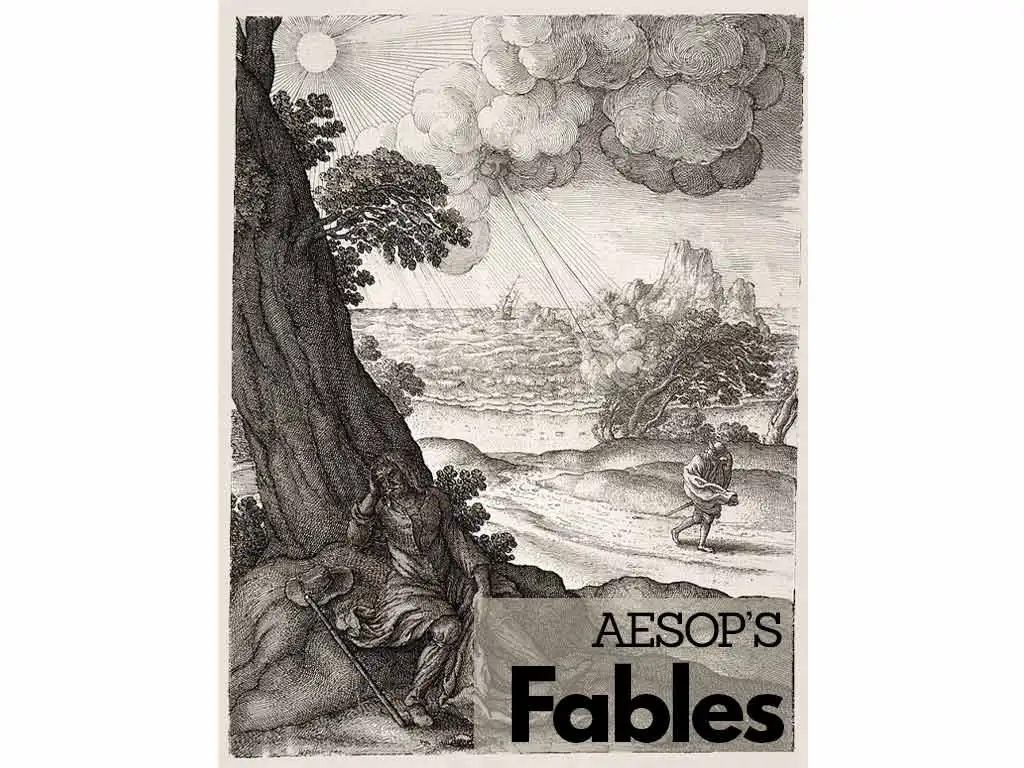This post may contain affiliate links which means we might earn a small commission if you decide to make a purchase through them (at no extra cost to you). Need more info? Click Here
Aesop’s Fables are timeless classics that are well known for their unique stories and timeless wisdom. They are often enjoyed by all ages, from children and teens to adults, and each story has something for everyone. Just like the great poet Homer, who wrote The Odyssey, Aesop’s Fables originated in ancient Greece at around 610 BCE.
Although not too much is known about Aesop himself, it is said that he was born a slave. It is believed that he was owned by a man named Jadmon who gave him his freedom because he was so impressed by his wisdom. As a free man, Aesop traveled through many countries and even worked for the Kind Of Lydia.
Originally all of Aesop’s fables were passed down orally and were only collected and written down about three centuries after his death. – his stories were some of the first to be translated from their original Latin and Greek into other translations and languages. Download a free copy of our Aesop’s Fables PDF down below.
Aesop’s Fables PDF Download
You can download your free copy of our Aesop’s Fables PDF by clicking the button below. Depending on what device you are using, the PDF book will either open in a new tab or download to your device.
If you would like to download a copy of our Aesop’s Fables book to your device, you can right-click the button and choose “Save As”.
Are The Aesop’s Fables and Stories Free To Download?
Yes, they are! Aesop’s Fables are ancient Greek stories that have been in the public domain for many generations. You are therefore welcome to download and read it for free. We hope you enjoy them!
What Are Fables?
Fables are short stories that teach us lessons about life. Usually, animals with human characteristics are used in the stories, so they are easy to relate to and are especially enjoyed by children. The lesson, or moral to the story, is sometimes given at the end of the story.
What Was Aesop’s Most Famous Fable?
Aesop has many famous fables! And although most people know his fables well, not everyone knows that Aesop was their author. Here are four of Aesop’s most famous fables:
The Hare And The Tortoise
A hare one day ridiculed the short feet and slow pace of the Tortoise, who replied, laughing: “Though you be swift as the wind, I will beat you in a race.” The Hare, believing her assertion to be simply impossible, assented to the proposal; and they agreed that the Fox should choose the course and fix the goal. On the day appointed for the race the two started together. The Tortoise never for a moment stopped, but went on with a slow but steady pace straight to the end of the course. The Hare, lying down by the wayside, fell fast asleep. At last waking up, and moving as fast as he could, he saw the Tortoise had reached the goal, and was comfortably dozing after her fatigue.
Aesop’s Fables | The Hare And The Tortoise
Slow but steady wins the race.
The Boy Who Cried Wolf (The Shepherd Boy and the Wolf)
A shepherd-boy, who watched a flock of sheep near a village, brought out the villagers three or four times by crying out, “Wolf! Wolf!” and when his neighbors came to help him, laughed at them for their pains. The Wolf, however, did truly come at last. The Shepherd-boy, now really alarmed, shouted in an agony of terror: Pray, do come and help me; the Wolf is killing the sheep; but no one paid any heed to his cries, nor rendered any assistance. The Wolf, having no cause of fear, at his leisure lacerated or destroyed the whole flock.
Aesop’s Fables | The Shepherd’s Boy and the Wolf
There is no believing a liar, even when he speaks the truth.
The North Wind And The Sun
The north wind and the Sun disputed as to which was the most powerful, and agreed that he should be declared the victor who could first strip a wayfaring man of his clothes. The North Wind first tried his power and blew with all his might, but the keener his blasts, the closer the Traveler wrapped his cloak around him, until at last, resigning all hope of victory, the Wind called upon the Sun to see what he could do. The Sun suddenly shone out with all his warmth. The Traveler no sooner felt his genial rays than he took off one garment after another, and at last, fairly overcome with heat, undressed and bathed in a stream that lay in his path.
Aesop’s Fables | The North Wind and The Sun
Persuasion is better than Force.
The Ant and the Grasshopper
The ants were spending a fine winter’s day drying grain collected in the summertime. A Grasshopper, perishing with famine, passed by and earnestly begged for a little food. The Ants inquired of him, “Why did you not treasure up food during the summer?” He replied, “I had not leisure enough. I passed the days in singing.” They then said in derision: “If you were foolish enough to sing all the summer, you must dance supperless to bed in the winter.”
The Ant and the Grasshopper | Aesop’s Fables
The Ant and the Grasshopper Short Film
What Is Aesop’s Longest Fable?
The Miller, His Son, and Their Ass is Aesop’s longest fable with 394 words. This is followed by The Buffoon and the Countryman which is 385 words long.
The Miller, His Son, and Their Ass
A miller and his son were driving their Ass to a neighboring fair to sell him. They had not gone far when they met with a troop of women collected round a well, talking and laughing. “Look there,” cried one of them, “did you ever see such fellows, to be trudging along the road on foot when they might ride?” The old man hearing this, quickly made his son mount the Ass, and continued to walk along merrily by his side. Presently they came up to a group of old men in earnest debate. “There,” said one of them, “it proves what I was a-saying. What respect is shown to old age in these days? Do you see that idle lad riding while his old father has to walk? Get down, you young scapegrace, and let the old man rest his weary limbs.” Upon this the old man made his son dismount, and got up himself. In this manner they had not proceeded far when they met a company of women and children: “Why, you lazy old fellow,” cried several tongues at once, “how can you ride upon the beast, while that poor little lad there can hardly keep pace by the side of you?” The good-natured Miller immediately took up his son behind him. They had now almost reached the town. “Pray, honest friend,” said a citizen, “is that Ass your own?” “Yes,” replied the old man. “O, one would not have thought so,” said the other, “by the way you load him. Why, you two fellows are better able to carry the poor beast than he you.” “Anything to please you,” said the old man; “we can but try.” So, alighting with his son, they tied the legs of the Ass together and with the help of a pole endeavored to carry him on their shoulders over a bridge near the entrance to the town. This entertaining sight brought the people in crowds to laugh at it, till the Ass, not liking the noise nor the strange handling that he was subject to, broke the cords that bound him and, tumbling off the pole, fell into the river. Upon this, the old man, vexed and ashamed, made the best of his way home again, convinced that by endeavoring to please everybody he had pleased nobody, and lost his Ass in the bargain.
Aesop’s Fables | The Miller, His Son, and Their Ass
How Many Aesop’s Fables Are There?
The Britannica Encyclopedia says that Aesop is attributed with up to 200 fables.
The Western tradition of fable effectively begins with Aesop, a likely legendary figure to whom is attributed a collection of ancient Greek fables. Modern editions contain up to 200 fables, but there is no way of tracing their actual origins; the earliest known collection linked to Aesop dates to the 4th century BCE.
Britannica | Aesop
However other sources attribute him with way more! Over 600 in fact! World History Encyclopedia says that he has 725 fables.
Written by a former Greek slave, in the late to mid-6th century BCE, Aesop’s Fables are the world’s best known collection of morality tales. The fables, numbering 725, were originally told from person-to-person as much for entertainment purposes but largely as a means for relaying or teaching a moral or lesson.
World History Encyclopedia | Aesop’s Fables
Our Aesop’s Fables PDF contains 310 of Aesop’s Fables.
Conclusion
Aesop’s Fables are incredibly well-known short stories that teach important lessons about life and they are perfect for children and adults alike. Download a free copy of Aesop’s Fables PDF here.
More Free Classic English PDF Books to Enjoy:
Around The World In Eighty Days
The Great Gatsby
Frankenstein
Jane Eyre
Pride And Prejudice
Alice In Wonderland





